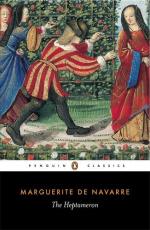From what went before it Margaret could, and could not, borrow certain well-defined things. Models both Italian and French gave her the scheme of including a large number of short and curtly, but not skimpingly, told stories in one general framework, and of subdividing them into groups dealing more or less with the same subject or class of subject. She had also in her predecessors the example of drawing largely on that perennial and somewhat facile source of laughter—the putting together of incidents and phrases which even by those who laugh at them are regarded as indecorous. But of this expedient she availed herself rather less than any of her forerunners. She had further the example of a generally satirical intent; but here, too, she was not content merely to follow, and her satire is, for the most part, limited to the corruptions and abuses of the monastic orders. It can hardly be said that any of the other stock subjects, lawyers, doctors, citizens, even husbands (for she is less satirical on marriage than encomiastic of love), are dealt with much by her. She found also in some, but chiefly in older books of the Chartier and still earlier traditions, and rather in Italian than in French, a certain strain of romance proper and of adventure; but of this also she availed herself but rarely. What she did not find in any example (unless, and then but partially, in the example of her own servant, Bonaventure Des-periers) was first the interweaving of a great deal not merely of formal religious exercise, but of positive religious devotion in her work; and secondly, the infusing into it of the peculiar Renaissance contrast, so often to be noticed, of love and death, passion and piety, voluptuous enjoyment and sombre anticipation.
But it is now time to say a little more about the personality and work of this lady, whose name all this time we have been using freely, and who was indeed a very notable person quite independently of her literary work. Nor was she in literature by any means an unnotable one, quite independently of the collection of unfinished stories, which, after receiving at its first posthumous publication the not particularly appropriate title of Les Amants Fortunes, was more fortunately re-named, albeit by something of a bull (for there is the beginning of an eighth day as well as the full complement of the seven), the Heptameron.




